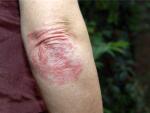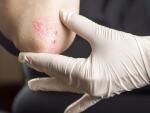
Like the more well-known plaque psoriasis, genital psoriasis is a chronic skin condition that can’t be cured, but its symptoms may be managed with proper treatment. Characterized by red, shiny skin patches in intimate areas, it’s important to know genital psoriasis isn’t contagious. However, the angry red rash can look concerning if you don’t know what it is. Here are 10 things to help you understand what genital psoriasis is and what you can do about it.
1. Genital psoriasis is not rare.
Psoriasis in general affects up to 5% of people around the world and it’s estimated that between 7% and 40% of people with psoriasis also have genital psoriasis. However, there may be even more people living with the condition who are too embarrassed to ask their doctor about it.
2. Genital psoriasis can appear anywhere in the genital area.
Genital psoriasis can appear anywhere in the genital area, affecting both men and women. For men, rashes could appear on the shaft or gland of the penis, or on the scrotum. For women, the rash may appear in the vulva area, including around the vagina. And in both men and women, rashes may also appear around the anus, in the folds of the buttocks, between the thighs and groin, and on the pubis.
3. Genital psoriasis rash differs from plaques.
Genital psoriasis rashes are not scaly, like the psoriasis plaques that may appear elsewhere on your body. Instead, the rashes are often red, shiny and smooth. Their location keeps the rashes moist, so they don’t dry out as they would on your arm or face.
4. Certain factors can worsen genital psoriasis.
The rash associated with genital psoriasis may come and go without any apparent reason, but there are some factors that could worsen the rash and its symptoms. They include:
- Sweating
- Common psoriasis triggers, such as stress
- Rubbing and irritation in the area
- Excess body weight
- Fungal infections
- Yeast infections
5. Genital psoriasis may have different names.
Genital psoriasis may be called by other names, according to where it is located, such as:
- Flexural psoriasis, because it is found in skin folds, such as the buttocks crease
- Inverse psoriasis, also because it is found in the skin folds
- Vulvar psoriasis, around the vulva
- Penile psoriasis, on the penis
6. Treatment for genital psoriasis is different from other parts of the body.
The skin in your genital area is thinner and more delicate than other parts of your body. Therefore, you may not be given the same treatment to use on your genitals that you use elsewhere. For example, some commonly used corticosteroid ointments have too high a dose for the delicate skin of your genitals and they could cause damage. Other medications, like coal tar, are not recommended at all. Light therapy, often prescribed for psoriasis, may be too strong as well, so shorter, less intense treatment sessions may be recommended. Your dermatologist may also recommend oral or injectable medications that target the root of the psoriasis for more severe cases. One type of injectable medication, called a biologic, is derived from living organisms and blocks inflammation that causes psoriasis symptoms.
7. Genital psoriasis does not prevent sexual activity.
As long as it’s not painful to participate in sexual activity, there is no reason why you should not have sex because you have genital psoriasis. However, if you are having a flare-up (exacerbation), the friction may be uncomfortable or frequent sex could make symptoms worse. You may want to ask your doctor if there are certain lubricants that won’t worsen the skin rash or contribute to it, and you may find that using a lubricated condom can reduce discomfort.
8. Genital psoriasis is not contagious.
The red rash caused by genital psoriasis can look concerning to a sexual partner. Psoriasis is not contagious—it’s a chronic inflammatory disease that affects your skin. It cannot be transferred to another person during sexual activity.
9. You may be able to reduce flare-ups.
Your doctor may suggest using creams and medications to help manage flare-ups, but there are some other effective steps you can take that could decrease the number of flare-ups and their intensity. To stay in control of your genital psoriasis:
- Keep your genital area clean with products that don’t contain scents or harsh ingredients
- Pat the area dry after bathing or washing instead of rubbing
- Wear loose, cotton underwear
- Wear loose-fitting clothing
10. Your doctor won’t be shocked.
Even if you’re embarrassed, speak with your doctor if you have signs of genital psoriasis. It is not uncommon and there is no reason not to seek treatment. Your doctor has seen this before and has been trained to help. Discuss your symptoms and allow your doctor to do an examination. Often, especially if you already have been diagnosed with psoriasis, your doctor will be able to diagnose you right away and prescribe treatment.






























